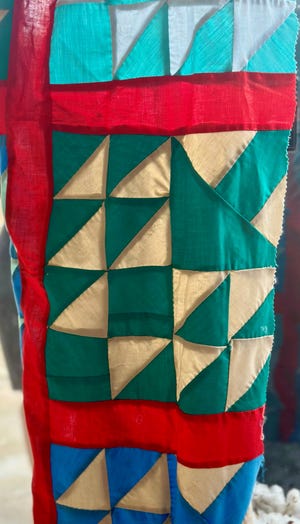This article is part of a partnership between the Montgomery Advertiser and Auburn University’s Living Democracy program, now in its 13th year, in which students spread out across rural Alabama and spend 10 weeks learning about the inner workings of their communities and writing down their observations.
CAMDEN — Betty Anderson’s annual Juneteenth celebration in Camden has continued to grow since its humble beginnings in 2006. What was once a small gathering in her home has grown so popular that it has necessitated a move to a larger venue.
This year’s celebration moved to the Old Ratcliff Building, where a diverse crowd of over 100 people gathered, including participants from all over Alabama. Colorful quilts in a variety of patterns adorned the walls as dozens of children, visitors and seniors gathered.
Anderson explained how the patterns on the quilts became symbols of slaves fleeing to freedom, reflecting the theme of the celebration in 2024. She told the audience that she was inspired to learn about those symbols based on the book “Hidden in Plain View: A Secret Story of Quilts and the Underground Railroad” by Jacqueline L. Tobin and Dr. Raymond G. Dobard.

Anderson said the book inspired her to learn more about Harriet Tubman and how she made quilts and how they were used as signals for slaves to escape to freedom. She walked around the room pointing out the quilts on display and explaining the deeper meanings of the quilt patterns, connecting them to the importance of Tubman and the quilters of Gee’s Bend in Wilcox County.
An excerpt from “Hidden in Plain View” explains, “African American quilters act as fabric griots, messengers, transmitting traditions just as they represented the means by which enslaved people escaped the plantations and made the journey to freedom. Using mundane objects to convey secrets is part of African culture.”
More: Alabama linguist talks about unique Wiregrass dialect
Juneteenth, which became a federal holiday in 2021, originated in Texas and commemorates the day when news of the Emancipation Proclamation reached the last group of enslaved African Americans in the United States, signaling the end of slavery in the United States.
Anderson said her greatest hope for Juneteenth is to increase understanding and appreciation for quilts. Beyond their practical use as bedding, quilts have played an important role in African-American culture. They are often used to tell stories, convey messages and preserve cultural traditions, Anderson noted, making them powerful symbols of resilience and resistance.
One of several examples Anderson noted was the “Flying Geese” pattern. According to one account in “Hidden in Plain View,” flying geese quilts gave “cues of direction, time and action” to slaves fleeing north to freedom.

Another quilt she featured is the Log Cabin quilt, which has a central shape representing a fireplace or hearth – a warm place. The “hidden” meaning refers to a safe home for people traveling on the Underground Railroad.
While preparing for this year’s event, Anderson visited a local antiques store, Southern Accents, where owner Caroline Vick Brooks donated a quilt that once belonged to a relative to the program. The quilt, similar to one Anderson has on display at her own Camden Shoe Shop and Quilt Museum, provided a colorful backdrop for the program.
Gee’s Bend quilters, her museum and other local quilters are working together to preserve the tradition of making handmade quilts in Wilcox County, Anderson said.

Anderson noted that African-American spirituals were also used as signals and encouragement for slaves wanting to escape. Kristin Weetz of Selma began the program by explaining the importance of spirituals such as “Every Time I Feel the Spirit” and “Wade in the Water.”
Children from the Camden Youth Development Center came together to sing these songs and others. Other local teens from BAMA Kids also performed. Helen Parnell and Reverend McNair Ramsey also participated in the program dedicated to Eugene Hudson’s memory.
The event was a true community outreach effort, sponsored by local establishments such as Jackson’s Station, Rack & Reels, Piggly Wiggly and Larry’s Drive-In. The program concluded with a parade through the streets of Camden.
Read more: Fashion Obsessed: Childhood shopping sprees with grandmother inspire Camden woman to open boutique
Dr Richard Bailey, a historian specialising in American history, said the Juneteenth celebration was important in honouring and preserving history.
Anderson said he will continue to work with others to host Juneteenth celebrations in Camden because it is an opportunity to celebrate history and culture.
Naomi Taylor, a living democracy student at Auburn University, is living and learning this summer as a Jean O’Connor Snyder intern at the David Matthews Center for Civic Life in Camden, Ala. The nonprofit program, coordinated by the College of Liberal Arts’ Caroline Marshall Draughon Center for the Arts and Humanities, prepares college students for civic life through a summer lived-learning experience.


